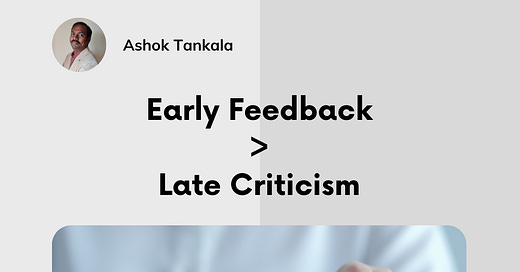Stop Waiting! Timely Feedback Drives Performance and Morale
As a manager, you play an important role in guiding your team to success. One of the most important & powerful things you can do is give feedback. But how you are going to do this make or break your team's performance and morale. If you wait and give feedback at the time of Appraisal it becomes criticism, not feedback that's why it's always better to give early feedback. 🗣️💬
The Problem with Late Criticism
You sat down with one of your team members and started listing areas where he/she didn’t meet expectations. Your team member is caught off guard. They thought they were doing okay. Now, they’re facing a disappointing review and didn’t have a chance to improve earlier.
Nobody likes bad news, especially when it comes as a surprise. They will wonder why you didn’t tell them sooner so they could fix the issues.
The Advantage of Early Feedback
Early feedback, on the other hand, is like a gentle nudge in the right direction. When you notice a problem or see an opportunity for improvement, addressing it immediately gives your team member a chance to adjust their approach.
Here’s why early feedback is beneficial:
1. Clarity and Focus: Regular feedback helps employees understand what they are doing well and where they need to improve. It sets clear expectations and keeps them focused on the right goals.📈🔍
2. Boosted Morale: Knowing that their manager is paying attention and is invested in their growth can be incredibly motivating. It shows you care about their success.🚀💪
3. Continuous Improvement: Small, timely corrections prevent bigger issues. It encourages a culture of learning and adaptability.🛠️🌱
How to Give Effective Early Feedback:
1. Be Specific: Instead of saying, “You need to improve your work,” point out particular behaviours or results. For example, “I noticed that your last week’s mail to the client missed this key data. Let’s ensure we include that in the future.”📝
2. Keep it Private: Feedback is best delivered in a one-on-one setting. This ensures that the conversation is constructive and focused on development, without the embarrassment of public criticism.🤝
3. Be Balanced: Highlight what’s working well, not just what needs to be improved. Acknowledge their efforts and successes, which reinforces positive behaviours.🏆⚖️
4. Follow-Up: After giving feedback, check in to see how the employee is progressing. Offer support and resources if needed. This shows your commitment to their improvement and helps build trust.📞👂





